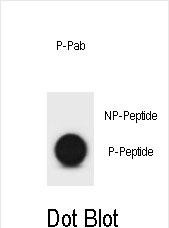
| WB | DB: 1/500 | Human,Mouse,Rat |
| IF | 咨询技术 | Human,Mouse,Rat |
| IHC | 咨询技术 | Human,Mouse,Rat |
| ICC | 技术咨询 | Human,Mouse,Rat |
| FCM | 咨询技术 | Human,Mouse,Rat |
| Elisa | 咨询技术 | Human,Mouse,Rat |
| Aliases | Tuberin, Tuberous sclerosis 2 protein homolog, Tsc2 |
| WB Predicted band size | 202.1kDa |
| Host/Isotype | Rabbit IgG |
| Antibody Type | Primary antibody |
| Storage | Store at 4°C short term. Aliquot and store at -20°C long term. Avoid freeze/thaw cycles. |
| Species Reactivity | Mouse |
| Immunogen | This mouse TSC2 Antibody is generated from rabbits immunized with a KLH conjugated synthetic phosphopeptide corresponding to amino acid residues surrounding S1421 of mouse TSC2. |
| Formulation | Purified antibody in PBS with 0.05% sodium azide. |
+ +
以下是关于Phospho-mouse TSC2(S1421)抗体的3篇参考文献,按研究领域和内容概括整理:
---
1. **文献名称**:*TSC2 is phosphorylated and inhibited by Akt and suppresses mTOR signalling*
**作者**:Inoki, K. et al.
**摘要**:该研究揭示了Akt激酶通过磷酸化TSC2(S939和S1421位点)抑制其功能,从而解除对mTORC1通路的抑制作用,促进细胞生长。实验中使用Phospho-TSC2(S1421)抗体验证了该位点在小鼠细胞中的磷酸化响应生长因子刺激。
2. **文献名称**:*Identification of the tuberous sclerosis complex-2 tumor suppressor gene product tuberin as a target of the phosphoinositide 3-kinase/Akt pathway*
**作者**:Manning, B.D. et al.
**摘要**:研究发现PI3K/Akt信号通路通过磷酸化TSC2的多个位点(包括S1421)调控其亚细胞定位及功能,使用特异性抗体证实该磷酸化事件在小鼠模型中影响肿瘤形成和代谢稳态。
3. **文献名称**:*mTOR signaling in growth control and disease*
**作者**:Laplante, M. & Sabatini, D.M.
**摘要**:这篇综述总结了mTOR通路中TSC复合体的核心作用,特别提到TSC2(S1421)的磷酸化作为Akt下游的关键调控节点,相关抗体被广泛用于检测能量应激或胰岛素刺激下的小鼠组织样本。
---
**备注**:若需具体实验细节或抗体货号,可进一步检索上述文献的补充材料或引用这些研究的后续工作。
Phospho-mouse TSC2 (S1421) antibody is a specialized tool used to detect the phosphorylation status of threonine complex 2 (TSC2) at serine residue 1421 in mouse-derived samples. TSC2. encoded by the Tsc2 gene, is a tumor suppressor protein that forms a heterodimeric complex with TSC1. This complex acts as a critical regulator of the mechanistic target of rapamycin (mTOR) signaling pathway, primarily by inhibiting the small GTPase Rheb, which directly activates mTOR complex 1 (mTORC1). Phosphorylation of TSC2 at S1421. mediated by kinases such as Akt (protein kinase B) and AMP-activated protein kinase (AMPK), modulates the activity of the TSC1-TSC2 complex. This post-translational modification is associated with cellular responses to growth factors, energy status, and stress, influencing mTORC1-driven processes like cell growth, proliferation, and autophagy.
The antibody is widely employed in studies investigating mTOR pathway dysregulation in diseases such as cancer, metabolic disorders, and neurological conditions. It enables researchers to assess TSC2 phosphorylation dynamics in mouse models, providing insights into upstream signaling events and therapeutic targets. Validation typically includes Western blotting, immunohistochemistry, or immunoprecipitation using cell lysates or tissues with activated mTOR signaling. Specificity is confirmed by comparing signals in wild-type versus Tsc2-deficient samples or after phosphatase treatment. Researchers rely on this antibody to explore molecular mechanisms underlying tuberous sclerosis complex (TSC)-related pathologies, metabolic adaptation, and drug responses, making it a key reagent in mTOR-centric biomedical research.
×